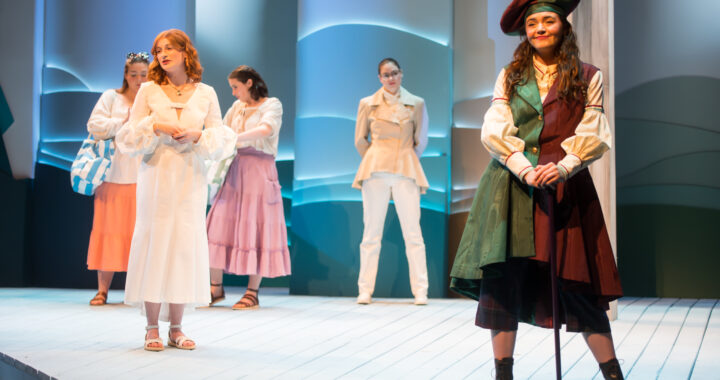Actors confess
3 min readBY ELISE MINNICK
Sophomore Cameron Doucette believes that the fantastic reception “Goodnight Desdemona (Good Morning Juliet)” has received on campus is due, in part, to the fact that students can connect with the frustrating ideas of Shakespeare.
“We want to see Shakespeare unraveled,” Doucette said, “‘Goodnight Desdemona (Good Morning Juliet)” reinterprets classic plays.”
“Goodnight Desdemona (Good Morning Juliet),” by Ann-Marie MacDonald, is a farce-style play about two of Shakespeare’s famous works: “Romeo and Juliet” and “Othello.”
Senior Helena Spadacene said the play was “smart and witty,” and to her it was obvious that the playwright was well-researched in Shakespeare.
“We get to see the twists of the stories while being entertained,” Spadacene said.
Now that the play has opened, what Doucette and Spadacene find interesting are the dynamic, constantly changing aspects of the performance.
“The play is still growing and changing every night,” Doucette said, who plays Romeo.
When asked what they disliked the most about working on this play, both Doucette and Spadacene replied, “nothing.”
They acknowledged the fact that rehearsals were time-consuming, but also claimed the energy from the cast, the crew, and the play itself made the grueling rehearsals worthwhile.
On average, Doucette spent anywhere from 20 to 40 hours a week working on this production, which made keeping up with homework difficult, however, he says he somehow made it work.
Spadacene, who plays the lead role of Constance Ledbelly, said she spent all of her free time working on this play. She had the most lines to memorize, and she also had to figure out “what to do with the lines” once she memorized them.
Doucette and Spadacene both noted that one of the biggest challenges of “Goodnight Desdemona (Good Morning Juliet)” was making it seem genuine. The director, Marc Williams, a UMW alumnus helped them with this process greatly.
Spadacene loved the enthusiasm Williams had throughout the process; he helped the students grow and learn as actors.
This process allowed for the production to feel genuine and true, not over the top and ridiculous, according to Doucette.
“You have to be true to the character then layer the funny on top of it,” Spadacene said. “The truth is even funnier when we think it’s the truth.”
Through Williams’ encouragement, Doucette says that he found that he could “create true emotion” for his character, which helped to make his role more “real” and “not implausible.”
Spadacene said that the actors also made sure to listen to each other.
“As though every line spoken is a line heard for the first time,” she said.
This makes the play have an air of actual communication between the characters, and adds to the comedy of the play, according to Spadacene.
She admitted that her biggest personal challenge in regards to this show was trying to “create a relationship with each character to make it feel real.”
Since she interacted with every other character, she had to figure out how to address each of them in appropriate ways.
Spadacene referred to theatre as a “family,” and said that the group of actors was able to reveal new things to each other about characters and scenes that had not been noticed before.
“Everyone got along…there were many friendships created,” Doucette said. “Students new to the theatre department quickly became friends with the rest of the cast and crew. Everyone was willing to dive into something new.”
Spadacene said that the energy that every single person working on this performance had to be positive and ongoing for the sake of the show.
“Every person has to be dedicated and excited about the play,” she said. Everyone involved has to work together; if someone’s not trying, the scene won’t work.”
She also claimed that in order to create a cohesive work of art “You have to appreciate what each person brings to the show,” whether it’s cast crew, or faculty.
“Goodnight Desdemona (Good Morning Juliet)” was one of the first physical comedies Doucette has been involved in. According to him, this play was “the most fun to work on” of all the productions in which he has been involved.
“It was fun to be comedic instead of dramatic,” Doucette said.
Spadacene said that this show is “a mixture of other shows I’ve been in; it was colorful and loud,” which, according to her, made it fun and exciting to work on.
“This is one of the greatest shows I’ve ever been involved in,” Spadacene said.











